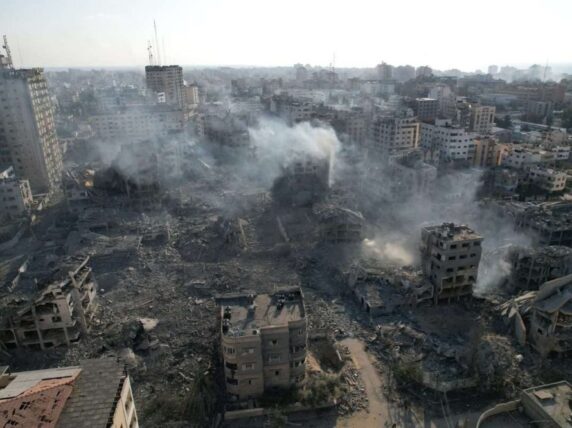Conflict and hunger: Can we make famine a thing of the past?
In 2017, 124 million people faced crisis-levels of food insecurity in over 50 countries, with conflict the key driver of acute food insecurity in 60% of cases. And last year famine was declared in parts of South Sudan and alerts issued for Nigeria, Somalia and Yemen, all driven by conflict.
Food is political – in some conflicts it is deliberately withheld from populations by armed groups, effectively using it as a weapon of war. Restrictions on aid agencies’ ability to access certain areas and violence against humanitarian workers makes it difficult to reach those in most need. In South Sudan, around 6.1 million are in need of urgent food assistance, yet aid reaches less than half of all households who need it, primarily due to insecurity. Earlier this year the country marked the tragic milestone of 100 aid workers killed since the conflict began.
Conflict destroys livestock, infrastructure, and agricultural land and drives people from their homes and means of earning a living. It also disrupts food markets, pushes up food prices and causes the breakdown of social support networks. Indeed, the negative impacts on food insecurity go way beyond the frontlines and last beyond the fighting.
So what needs to happen?
We know many of the steps that are required to make famine a thing of the past:
- a rapid increase in the levels of investment in nutrition in the hungriest places
- a reduction in the number of conflicts through increased investment in peacebuilding
- continued economic growth in poorer countries
- good national governance and international political will to act when a government is overwhelmed.
Subscribe to our newsletter
Our weekly email newsletter, Network News, is an indispensable weekly digest of the latest updates on funding, jobs, resources, news and learning opportunities in the international development sector.
Get Network NewsNone of these will be easy to achieve. However, there have been some recent positive movements at the global policy level. In May 2018 the UN Security Council passed Resolution 2417, condemning the starving of civilians as a method of warfare and the unlawful denial of humanitarian access to civilian populations – although the test will be in how the Resolution is monitored and implemented.
Last month a group including the UN and the World Bank launched the Famine Action Mechanism promising better early warning mechanisms and “…pre-arranged financing to ensure that funds are released before a crisis emerges”. This is critical, as it is not the lack of information that has prevented effective responses to food crises, but slow and inflexible funding mechanisms, compounded by a lack of political will.
While these are promising developments it is clear there is a huge distance to go in ending famine and hunger. But we know it is possible where the political will exists. In Somalia last year the combined efforts of local people, the government, donors and aid agencies prevented the widespread famine that had occurred in 2011-12. With flexible funds from DFID, Concern’s staff anticipated drought and acted before the crisis, enabling UK aid to help people to stay in their homes in search of food rather than abandon them, and even open their homes to those in need from nearby villages.
The role of NGOs
NGOs are often best placed to reach those in the hardest to reach areas, with the trust of local people and the ability to negotiate humanitarian access. However, we can all do more, for example:
- ensure our programmes are sensitive to the context and designed to reduce conflict’s impacts on different communities and members
- support local-level peacebuilding, conflict prevention and resolution initiatives as part of integrated responses in conflict-affected contexts
- put pressure on donors to ensure aid is targeted at the most vulnerable communities and sufficiently focused on addressing hunger and conflict.
Making famine a thing of the past will require enhanced cooperation between governments and non-governmental actors, increased investment in tackling malnutrition, and sustained political will and commitment to addressing conflict, internationally, nationally and locally.
This is why Concern is bringing together a group of UN, government and NGO representatives on 17th October, to discuss the challenges presented by conflict and hunger and how collectively we can address them. Speakers include Mark Lowcock, UN Under Secretary General for Humanitarian Affairs; Ciaran Cannon, Irish Minister for International Development; Matthew Rycroft, Permanent Secretary, DFID.
To watch the livestreamed event from 4pm on the 17th follow us: @ConcernUK
Read Concern’s reports on hunger and conflict here: www.concern.org.uk/50-London
Category
News & ViewsThemes
Humanitarian



